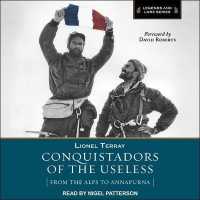- ホーム
- > 洋書
- > 英文書
- > Philosophy
Full Description
Without deference to any one religious tradition, Philosophies of the Self makes cross-cultural analysis possible by introducing a multitude of understandings about ourselves that change how we think not only about philosophy of religion but philosophy in general.
This is a guide to the many different concepts of the self found in traditions around the world. Ideal for independent study or classroom teaching, Philosophies of the Self represents a break with the orientalist problems around the "East-West" dichotomy. By refusing to defer to any religious tradition, it allows you to learn about and evaluate philosophical conceptions of the self from a broad range of cultures.
Covering Shinto, Afro-Brazilian, Jain, Nyaya, Daoist, Nguni, as well as specific philosophical paradigms developed by Iqbal, Ifeanyi Menkiti, and Jacques Derrida, each chapter systematically explores conceptions of self that are specific to a philosophical tradition. Bringing together an international team of contributors, each chapter situates the concepts' definition, philosophical significance, historical context, and the relevant works or cultural locations in which they appear.
From broad, high-level comparison to in-depth, close reading, the structure allows you to engage with the different concepts in a variety of ways. You are able to compare foundational ideas, draw on suggestions for further research and choose a combination of chapters for an in-depth cross-cultural study.
Contents
Acknowledgements
Table of Contents
Editor's introduction: reconsidering discourses on "Self" in Anglophone philosophy of religion.
Section A: Self and Spirit(s)
1. Conceptions of 'self' in Shinto, Maki Sato (Assistant Professor, Graduate School of Arts and Sciences, The University of Tokyo)
1.1 Embodiment (Kami)
1.2 Pure-spirit (Tama)
1.3 value-neutral being (Kotodama)
2. Afro-Brazilian religions and Candomblé, José Eduardo Porcher, Assistant Professor, Universidade Federal do Rio Grande do Sul, Rio de Janeiro, Brazil, Fernando Carlucci: Research Fellow, Jesuit School of Philosophy and Theology (FAJE), Belo Horizonte, Brazil, Daniel De Luca-Noronha: Assistant Professor, Jesuit School of Philosophy and Theology (FAJE), Belo Horizonte, Brazil
2.1 Possession
2.2 Entities
2.3 Agency
3. uMina in Isintuism, Herbert Moyo (Professor, School of Religion, Philosophy and Classics, University of KwaZulu-Natal)
3.1 Impilo
3.2 Ukufa
3.3 Umoya
4. What makes a person Indigenous? Current conceptions among Native American sovereignty movements, Cindy Tekkobe, University of Illinois, Chicago
4.1 Relations
4.2 Reciprocity
4.3 Ceremony
Section B: Self and Society
5. Tshivenda, Self and Persistence, Mutshidzi Maraganedzha (Assistant Professor, School of Religion, Philosophy and Classics, University of KwaZulu-Natal)
5.1 Sialala
5.2 Murunzi
5.3 Thevhula
6. Embodying the Dao: Classical and Foundational Daoist Anthropological Views, Louis Komjathy (Independent scholar, Director and Distinguished Professor of Unlearning at The Underground University)
6.1 Pneumatology
6.2 Shen ? ("body/self")
6.3 Somatology
7. Selfhood in the Confucian Tradition, Andrew Lambert, City University of New York, College of Staten Island
7.1 Ren (humaneness, virtuosity)
7.2 Familial Bonds
7.3 Roles and Relationships
8. Iqbal and the Actualizing Self: Gift or Task?, Abrahim H. Khan (Professor, Faculty of Divinity at Trinity College, University of Toronto)
8.1 Love (Ishq)
8.2 Self (Khudi)
8.3 Self-actualization
Section C: Self and Ontology
9. Self's Awareness of the Self. The arguments of Udayana from the Indian Nyaya tradition, Agnieszka Rostalska (FWO Senior Postdoctoral Research Fellow, Faculty of Arts and Philosophy, Ghent University)
9.1 Self (atman)
9.2 Merits and Demerits (karma)
9.3 Self-Awareness
10. Self as Performance: Dogen's ethics of expression for today, Gereon Kopf, Luther College
10.1 pre-Dogen no/self
10.2 Dogen's no/self
10.3 Expression/performance
11. Conceptions of 'self' in Jainism, Anil Mundra (Alka Siddhartha Dalal Postdoctoral Fellow in the study of Jainism, Rutgers University) and Marie-Helene Gorisse (Postdoctoral Research Fellow, Department of Philosophy, Birmingham University)
11.1 soul (jiva)
11.2 experience/consciousness (upayoga)
11.3 liberation (mok?a)
12. Jacques Derrida's plural conception of 'self', Nathan Loewen (Associate Professor, Department of Religious Studies, University of Alabama)
12.1 Prosthesis
12.2 Secret
12.3 Inheritance
13. Critical Epilogue, Tim Knepper (Professor, Department of Philosophy and Religion, Drake University)







